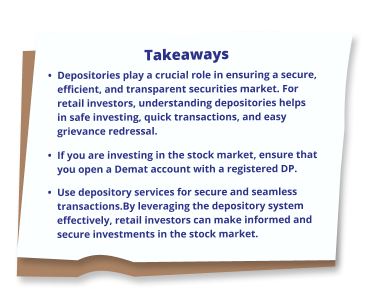Understanding Depositories
Understanding Depositories
The securities market is a complex ecosystem where depositories play a crucial role in ensuring efficient and secure transactions. This article aims to help retail investors understand the concept of depositories, their functions, services, the grievance redressal mechanism, timelines for services, and the key parties involved in the ecosystem.
Meaning of Depository: A depository is an entity that holds securities (shares, bonds, mutual funds, etc.) in an electronic or dematerialized form and facilitates their smooth transfer between buyers and sellers. The depository eliminates the risks associated with physical securities such as theft, forgery, and mutilation. In India, the depository system follows dematerialization, meaning that securities exist only as electronic records.

The two main depositories in India are:
National Securities Depository Limited (NSDL) - :Established in 1996.

Central Depository Services (India) Limited (CDSL)- Established in 1999.

Services Offered by Depositories: Depositories offer a wide range of services to investors, brokers, and other intermediaries, including:
Account Opening & Maintenance: Investors must open a Demat account with a Depository Participant (DP), similar to a bank account, to hold securities electronically.
Dematerialization & Rematerialization:
- Dematerialization: Converting physical securities into electronic form
- Rematerialization: Converting electronic securities back to physical certificates if required.
Transfer & Settlement of Securities:
- Depositories facilitate seamless and paperless transfer of securities for market transactions.
- Settlements happen electronically via book entries, eliminating physical transfer risks.
Pledging & Hypothecation: Investors can pledge securities held in their Demat account as collateral for loans.
Corporate Actions:Depositories help in the automatic credit of dividends, bonus issues, stock splits, and rights issues into investors' accounts.
Investor Protection & Nomination
- Investors can nominate beneficiaries for their securities.
- Depositories also provide insurance coverage to protect investors from fraudulent activities.
- Depositories ensure real-time tracking of transactions through their platforms, allowing investors to monitor their holdings easily.

Grievance Redressal Mechanism:
Investor protection is a key function of depositories. SEBI has set up the SEBI Complaints Redress System (SCORES) to ensure timely resolution of complaints. The Depository Participant must resolve complaints within 21 days. If unresolved, the case can be escalated to the depository and SEBI for further action.
Different Parties Involved in the Depository System
Depositories work within a network of intermediaries that help facilitate smooth transactions in the securities market.
Depositories (NSDL & CDSL)
Maintain securities in electronic form and ensure secure transactions.
Depository Participants (DPs)
- Intermediaries between depositories and investors (e.g., banks, stockbrokers)
- DPs handle account opening, securities transfer, pledging, and grievance redressal.
Clearing Corporations
- Ensure settlement of trades in stock exchanges
- Work with depositories to transfer securities from sellers to buyers.
Issuers (Companies)
- Companies issue shares, bonds, and mutual funds that get stored in electronic form with depositories.
Registrars and Transfer Agents (RTAs)
Handle corporate actions like dividend distribution and share allotment.
